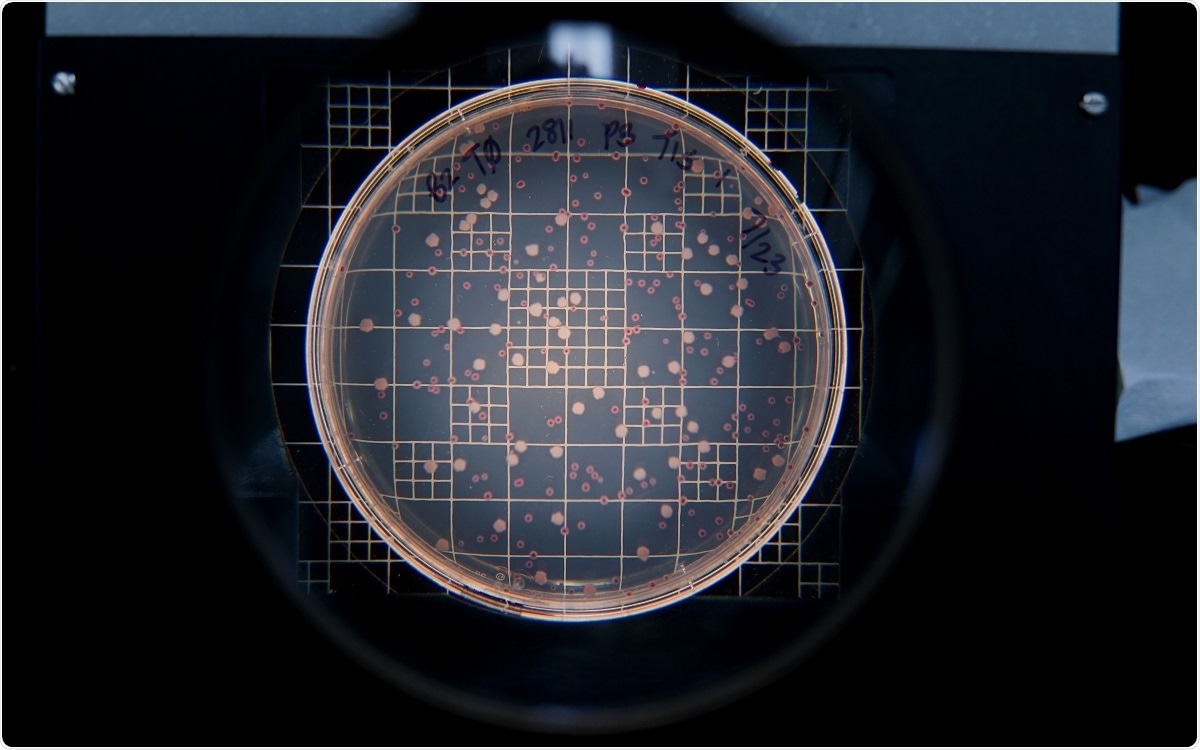Reviewed by Dan Hutchins, M.PhilJun 9 2021
The risk of antibiotic resistance increases as bacteria continue to evade even the most powerful contemporary medicinal treatments. Antibiotic-resistant microorganisms threaten to take more than 10 million lives by 2050, as present-day treatments prove ineffective.

After competing in flasks, different strains of bacteria are moved to agar plates where researchers can evaluate the “winner” by counting the numbers of those that survived. Bacteria are identified with red and white markers. Image Credit: University of California, San Diego.
Bacteriophage, also known as “phage,” have emerged as a new source of hope in the face of rising antibiotic resistance. Despite being ignored by Western science for many years, phages are now receiving more scientific interest because of their potential to infect and eliminate bacterial threats.
A new study headed by Joshua Borin, a graduate student in the Department of Biological Sciences at the University of California, San Diego, and a member of Associate Professor Justin Meyer's laboratory, has found that phages undergoing special evolutionary training boost their ability to neutralize bacteria.
Pre-trained phages, similar to a boxer preparing for a title fight, displayed the ability to postpone the onset of bacterial resistance.
The research work, which involved researchers from Israel’s University of Haifa and the University of Texas at Austin, was published in the Proceedings of the National Academy of Sciences.
Antibiotic resistance is inherently an evolutionary problem, so this paper describes a possible new solution as we run out of antibiotic drug options. Using bacterial viruses that can adapt and evolve to the host bacteria that we want them to infect and kill is an old idea that is being revived. It’s the idea of the enemy of our enemy is our friend.”
Joshua Borin, Graduate Student, Biological Sciences, University of California, San Diego
The concept of employing phages to fight bacterial illnesses dates back to before World War II. However, when antibiotics became the primary therapy for bacterial illnesses, phage studies for therapeutic potential were largely ignored. That attitude has shifted in recent years, as dangerous bacteria have evolved to make many modern drugs useless.
Borin's study aimed to train specialized phage to combat bacteria before they meet their final bacterial target. The investigation, which was carried out in laboratory flasks, revealed traditional evolutionary and adaptational mechanisms at work.
Meyer claimed that the bacteria reacted predictably to counter the phage attack. The difference lies in the preparation. The study showed that phages trained for 28 days inhibited bacteria 1,000 times more efficiently and for three to eight times longer than untrained ones.
The trained phage had already experienced ways that the bacteria would try to dodge it. It had ‘learned’ in a genetic sense. It had already evolved mutations to help it counteract those moves that the bacteria were taking. We are using phage’s own improvement algorithm, evolution by natural selection, to regain its therapeutic potential and solve the problem of bacteria evolving resistance to yet another therapy.”
Justin Meyer, Division of Biological Sciences, University of California, San Diego
The researchers are currently expanding their results to see how pre-trained phages function on clinically significant pathogens, like E. coli. They are also assessing how well training strategies work in animal models.
The University of California, San Diego, is a pioneer in phage research and therapeutic applications. The Center for Innovative Phage Applications and Therapeutics, the first specialized phage treatment center in North America, was established in 2018 by the university’s School of Medicine.
We have prioritized antibiotics since they were developed and now that they are becoming less and less useful people are looking back to phage to use as therapeutics. More of us are looking into actually running the experiments necessary to understand the types of procedures and processes that can improve phage therapeutics.”
Justin Meyer, Division of Biological Sciences, University of California, San Diego
Source:
Journal reference:
Borin, J. M., et al. (2021) Coevolutionary phage training leads to greater bacterial suppression and delays the evolution of phage resistance. Proceedings of the National Academy of Sciences. doi.org/10.1073/pnas.2104592118.